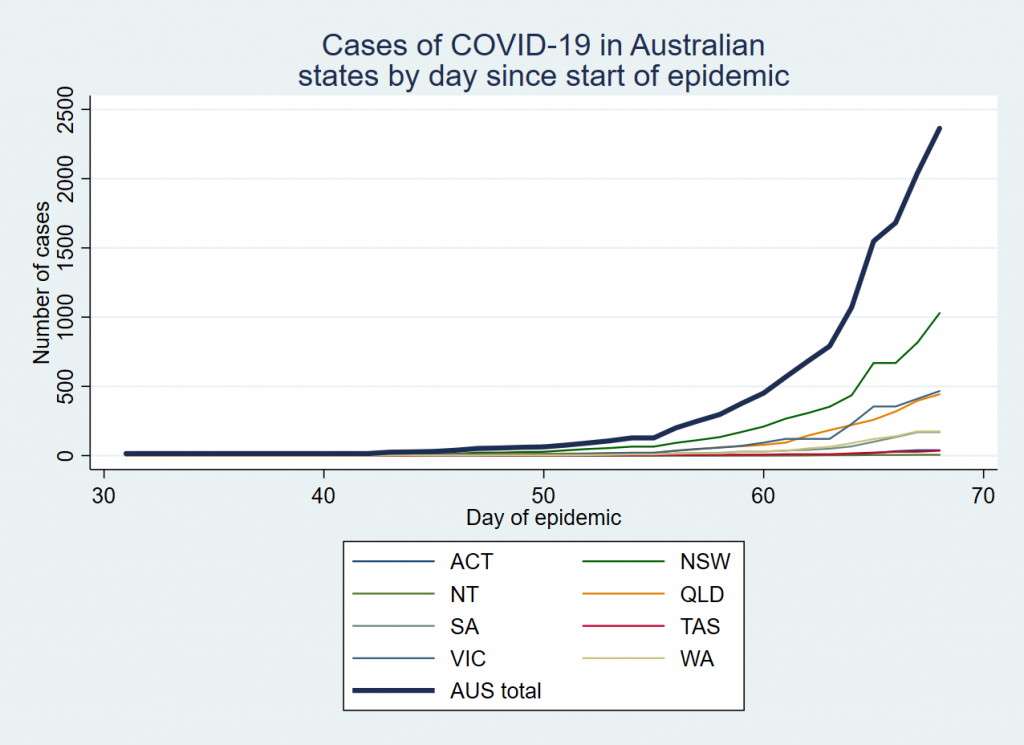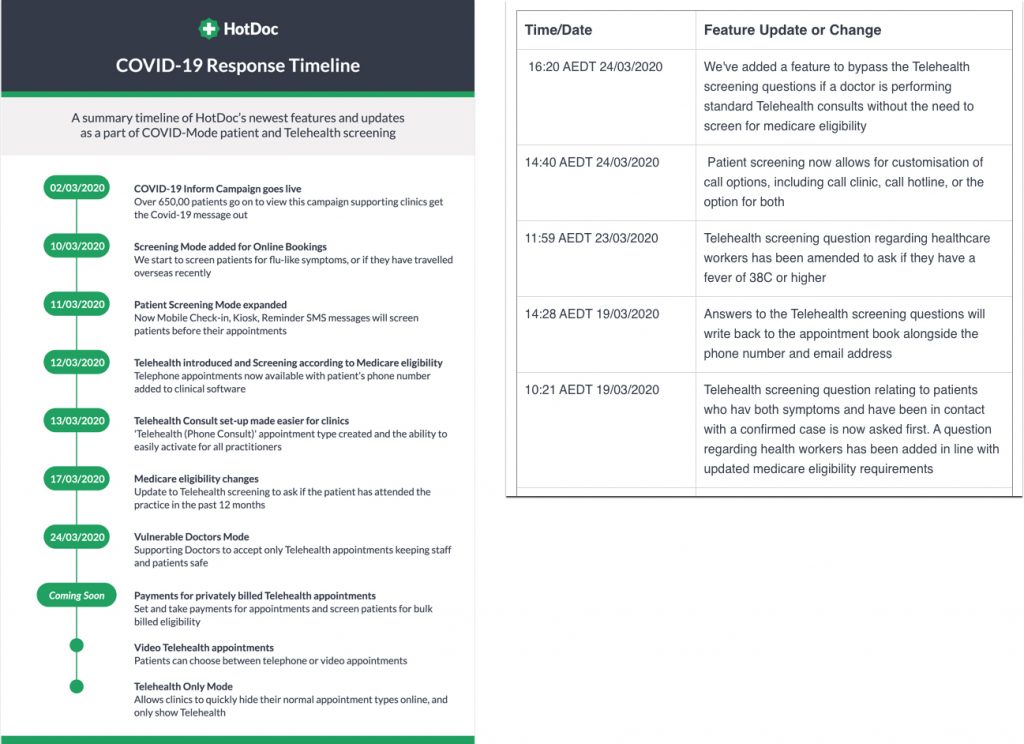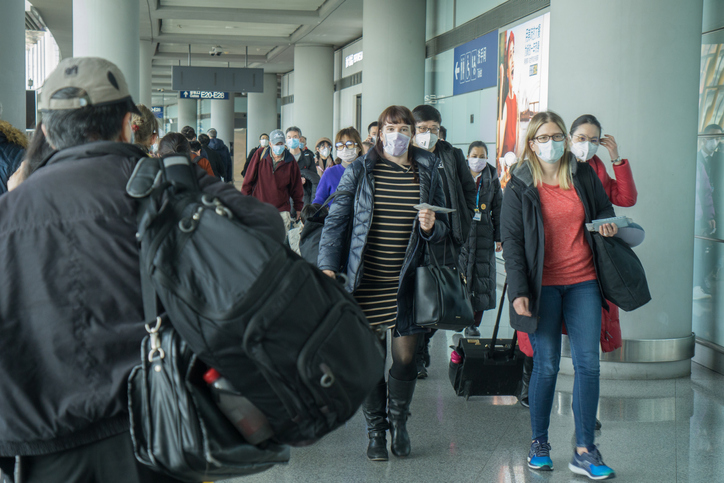Remote communities are out-of-bounds to visitors from midnight tonight, as federal, state and territory governments move to protect vulnerable Australians from COVID-19.
- Today’s wrap-up.
- Remote communities out-of-bounds from midnight tonight, but exemptions for health care service providers. Read more.
- Latest infection figures from NSW and Victoria here.
It’s a wrap for this first day of The Medical Republic‘s COVID-19 live blog. I hope these rapid-fire updates have been useful, but here’s a quick summary of the most important ones, in case you missed any:
- Non-urgent elective surgery now on hold for public facilities, but the deadline has been extended to 1 April for private hospitals.
- Paramedics are under the pump with COVID-19, so only call triple 0 if ‘really unwell’, says Australian Paramedics Association NSW State President Chris Kastelan.
- The Australian Commission on Safety and Quality in Healthcare is putting their usual three-year accreditation assessment cycles for GP clinics on hold.
- SBS has set up a multi-language portal on COVID-19 providing information, news and features in 63 languages.
- The COVID-19 complication of cardiac injury is associated with a 3-4-fold greater mortality risk, according to data from Wuhan.
- Remote communities are out-of-bounds from midnight tonight, but there are exemptions for health care service providers.
- Grey nomads: you’re grounded, says RDAA.
- And last of all, the MJA has just published a modelling study suggesting Australia will run out of intensive care beds by around 5 April, if public health measures fail to reign in COVID-19. But before you get too depressed, check out this article in the Guardian arguing that this pandemic has showed just how ropey modelling studies can be.
We’ll resume again at the crack of dawn tomorrow – or at least once the caffeine kicks in. Stay healthy.
5.10pm, 26 March
- Bowel cancer patients – “you may be isolated … but you are not alone,” says Bowel Cancer Australia. They’ve sent out a reminder that their Bowel Care Advisory Team can be contacted on 1800 555 494 or by email, and they have a wealth of online resources here.
4.30pm, 26 March
- The Fertility Society of Australia has recommended that patients think about postponing IVF treatment during the COVID-19 crisis.
As announced this morning, all elective surgeries will be cancelled after 1 April for private hospitals, so that will include any scheduled surgical procedures for IVF.
- Here are the latest COVID-19 data from NSW Health: 190 new cases were diagnosed from 8pm 24 March to 8pm 25 March, representing a total of 1219 confirmed cases in NSW since the beginning of the outbreak. Of these, 647 (53%) were acquired overseas. So far, 74,006 people have been tested in NSW.
Victoria has just reported its first two deaths from COVID-19 today; two men in their seventies. The state’s total number of infections now stands at 520.
With thanks to epidemiologist Dr Gideon Meyerowitz-Katz, here’s a chart of Australian, state and territory cases by day since the start of the epidemic.

- Remote communities are out-of-bounds to visitors from midnight tonight, as federal, state and territory governments move to protect vulnerable Australians from COVID-19. The government’s National Indigenous Australians Agency said people living in remote communities such as the elderly and those with existing medical conditions were particular at risk of complications from COVID-19.
Anyone (including residents) wanting to go into one of these designated areas – which are yet to be defined or listed – has to self-isolate for 14 days before they can enter, according to federal health minister Greg Hunt. Only people entering to supply and deliver essential services – including education and health services – will be allowed.
The Minister said there will be support for people who don’t have arrangements in place to allow them to self-isolate but didn’t go into the specifics of this.
We’ll update with details of restricted locations as soon as they’re available from state and territory governments.

- Grey nomads: you’re grounded. The Rural Doctors Association of Australia issued a stern instruction to silver-haired wanderers to temporarily give up their nomadic pursuits, and get back home to self-isolate safely. “We have had reports of convoys of grey nomads moving out into rural communities and quite frankly, that’s not acceptable,” said RDAA President Dr John Hall, pointing out that this put rural communities and other travellers at risk by potentially increasing circulation of the virus.
- Want some COVID-19 podcasts to listen to in your copious quantities of relaxation time? You know you do. For your enjoyment, Dr Charlotte Hespe, a GP and the chair of the RACGP for NSW and ACT has compiled a list of the college’s podcasts relating to COVID-19 in one convenient place. It includes the Practice THAT! and JustaGP podcast series from the NSW/ACT faculty, and The Good GP from the West Australian faculty. The podcasts cover everything from what to do if a staff member tests positive and implementing telehealth, to talking to children about COVID-19 and the impacts of the virus on pregnancy.
- SBS has launched a multi-language portal for COVID-19 news, which will provide the latest information on the pandemic in 63 languages. “There is nothing more important right now than to give people timely and accurate information in their language,” said SBS’s director of audio and language content, Mandi Wicks. SBS Radio is also working with health experts to focus on the most important messages to be communicated, and which communities are most in need, the broadcaster said.
- The deadline to freeze all non-urgent elective surgery has been extended to 11.59pm, 1 April for private hospitals, according to a spokesperson from the Department of Health. The original deadline for the freeze was midnight last night (Wednesday 25th), which was announced by the PM yesterday. The only exception is patients who are likely to deteriorate badly in the next 30 days, to the point where they might need emergency care.
- Ambulance services are being overrun, with call-out rates up as much as 6% on this time last year but staffing levels stuck at those of a decade ago. Australian Paramedics Association NSW State President Chris Kastelan told TMR that paramedic workloads are “insane” due to the COVID-19 crisis, and asked for GPs and the general community to only call 000 if they are very unwell. “If people who are unsure about their health then they should look to speaking to their GP, either in person or through teleconferencing facilities,” Kastelan said.
- A quick update on the story below that the PM announced a freeze on elective surgery, effective from midnight last night. The Medical Republic is now hearing reports that elective surgeries are still going ahead in NSW at the moment. We’re working to confirm this.
7am 26 March
Developments and updates are coming thick and fast, so here are some from late yesterday afternoon and early this morning:
- GP clinics have been given breathing space on their three-yearly accreditation assessments by the Australian Commission on Safety and Quality in Healthcare. The commission is freezing all accreditation assessment cycles, effective immediately, so whatever a clinic’s accreditation status is right now, it will keep that for the duration of this response phase of the COVID-19 pandemic.
If a clinic’s assessment was due to happen in a year, it will now happen a year after things go back to normal (whatever ‘normal’ is). If your clinic was waiting for an onsite assessment to finish the accreditation process, this will now be delayed.
They’re trying to take pressure off healthcare services – so no paperwork, no site visits – and reduce transmission of disease by not sending assessors out to clinics. The accreditation assessment cycles will restart once everything calms down a bit – the ‘recovery’ phase of the pandemic. More details can be found on the ACSQH website. - Prime Minister Scott Morrison announced that all non-essential elective surgery in public and private health systems is suspended to save resources such as protective equipment, and help health services “prepare for their role in the COVID-19 outbreak” (although I think we’re way past ‘prepare’ at this point). Only patients who are likely to deteriorate badly in the next 30 days, to the point where they might need emergency care, are still allowed to go ahead with surgery.
The Rural Doctors Association of Australia, the Australian College of Rural and Remote Medicine and the Australian Orthopaedic Association all said they supported the decision, with ACCRM President Dr Ewen McPhee saying, “This is a very sensible decision that will assist rural hospitals and health services to meet the incredible challenges ahead.”
However AOA President Dr Andrew Ellis stressed that urgent and essential orthopaedic surgery should still be allowed “in order to prevent long-term physical disability of those Australians most in need.” - The COVID-19 complication of cardiac injury – probably compounded by underlying cardiovascular disease – is associated with a 3-4-fold greater mortality risk, according to data from Wuhan published in JAMA Cardiology this morning.
A cohort study in 416 patients (age range 21-95 yrs, ~50% female) hospitalised with COVID-19 found nearly one in five patients had cardiac injury, defined as blood levels of cardiac biomarkers above the 99th-percentile upper reference limit. These patients had around a four-fold higher risk of death from their first onset of symptoms, and around a three-fold higher risk of death from the point at which they were admitted to hospital, compared to patients without cardiac injury. The authors said if confirmed, doctors may need to pay more attention to this particular complication when treating patients. - Nimble and adaptive are hallmark features of the digital world, but digital health vendors are having to execute some particularly nifty footwork to keep up with the pace of COVID-19 developments. Below are two snapshots of HotDoc’s product updates over the past month and the past few days, showing the speed of their developments and live launching. Apparently HealthEngine have a similar list.

- There are more modelling studies coming out than you can poke a very long, sterilised stick at. Some have already got traction on social media, like this one from the University of Sydney, published in arXiv (non-peer-reviewed preprint) which showed the difference between 70% of the population complying with social distancing and 80% of the population doing so is the difference between total failure and the chance of success. But 90% compliance could bring the pandemic under control within 13-14 weeks, if combined with case isolation and travel restrictions.
University of Western Australia researchers, published in medRxiv (non-peer-reviewed preprint) concluded that the single most effective intervention for COVID-19 was case isolation of 100% of children and 90% of adults.
And Singapore researchers writing in The Lancet found that the combination of quarantining infected people and families, closing schools, and workplace distancing could reduce infections by 99.3% by day 80. - In times like these, booze and hand sanitiser are life-savers. Happily, you can now get both from the same place. Gin-lovers can now work with the scent of mother’s ruin on their hands, with Australian distiller Archie Rose manufacturing hand sanitiser. In Western Australia, SPINIFEX Brewing Co and Limestone Coast Brewing have also turned their talents from beer to sanitiser.


